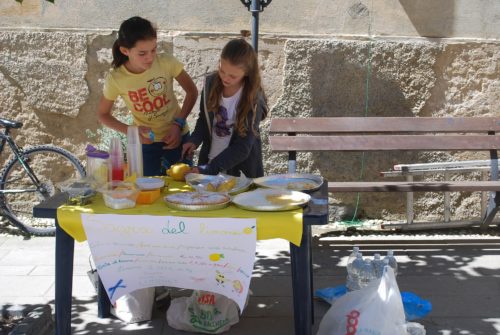I remember wanting to make my own money as a kid. I hated asking my parents, and because I came from a large family, they did not give us allowances – too many mouths to feed. So, I had to find ways to buy new clothes I wanted or the new guitar I so desperately desired.
I had a paper route when I was twelve; additionally, I saved empty pop and beer bottles. Every penny counted.
Pennies are no longer worth as much now, and today the world is a different place. The internet and its amazing ability to connect people creates new opportunities that previously weren’t possible.
Below we’ll go through a few easily implementable ideas that can help kids make their own money.

There are five factors to keep in mind as we consider how kids can make money:
- Age of the child
A child’s age provides some indication of maturity, though different kids can handle different levels of responsibility. A 16 year old babysitter is also likely going to command higher rates than a 12 year old babysitter. Their maturity is another element to consider.
2. Personal likes and dislikes of the child
A child’s likes and dislikes are powerful motivators regarding the direction he or she will go in. Do they like to be the boss, or do they feel more comfortable in following? Neither is right nor wrong. If the child is prone to take the proverbial bull by the horns, then perhaps it is wiser to gently direct them toward being their own boss, being involved in an ambitious for-profit endeavor. If the child is more inclined to taking direction and/or is very talented in a specific area, it may be better for him or her to look for a job.
3. Abilities
What are the child’s abilities? Does he or she have the social skills, communication, and organizational skills required for the idea? Is the child in good health? Does the child have a specific talent that can be leveraged up into a money-making idea and ultimately into an endeavor? Only you, as the parent, can answer the above questions, and it is only you who can significantly influence the child into a money-making program. It may be a good idea to sit down with your child and ask them those questions. I think you’ll be pleasantly surprised, and perhaps the answer to the original query will be answered by the child.
4. Their knowledge and experience
While it may seem
5. Focus
Focus is a primal requirement. It is what fuels the desire and the want for success, so parents may want to encourage the child to focus on their passion and the steps involved in getting to the realization of that desire. I remember a few years back listening to Mike Rowe, the television personality hosting the reality show Dirty Jobs for the Discover Channel, mention the fact that just dreaming about your desire does not make the desire a reality. It takes planning, hard work, and, most important, focus. If you want your kid to make money and be happy about it, then plan it out and encourage the hard work, innovation, social skills, and the amount of focus involved.

Sometimes it is best to determine the child’s understanding of the above areas so far discussed before we as parents start to encourage them in any one direction. What do they think they know and do not know? It will become abundantly clear the discrepancy between what they do and do not know. It will be enlightening and challenging for you as a parent and the child in question, but it will perhaps mitigate mistakes and the potential for disappointment on behalf of the child. I remember going through this very same exercise with my 23-year-old son still living in my basement playing computer games, being utterly derelict in his duty to get on with his life. I digress. Our sons and daughters never stop being our children.
Let’s step back and use the above five areas in two examples to see how it works.

Here’s my take on the child. He needs to be his own boss. He needs to be encouraged to provide a service or product that includes lots of physical activity and one where he is socially involved.
“So, what kind of business would that entail?” You ask.
- Perhaps collecting recyclables such as glass or plastic bottles from the neighbors or maybe picking berries, wild mushrooms, or roots for resale. Where I live, I’ve noticed many youngsters selling corn, strawberries, and/or blueberries on the side of neighborhood roads. What is the difference between selling lemonade or corn? Nothing except the specific type of product to be sold.
- Another potential idea is pet walking or playing with the pet. Many older people have pets for personal enjoyment to alleviate boredom or loneliness. Pet walking is a burgeoning industry, and perhaps one an active kid can maintain his or her interest.
- Another idea is taking broken or lost items and restoring them to a useful and desirable state for resale. When I was a kid, I would go to the city dump and collect bicycle parts to make bicycles to sell to my friends.
- One last idea is helping older people clean out their garages, basements, or sheds. It is incredible the treasures that a kid can find for restoration and resale while providing the service. Many people are quite willing to give the child the items rather than see them go into a landfill.

Yes, perhaps a bit stereotypical as an example, but hey, it’s the best I can come up with. Anyways, what would you say or do to encourage this youngster? To recap., she has learned fine motor skills through her dance and art lessons. She has a very active mind and loves to solve complex problems. She is a no-nonsense individual and thrives on exercising her mind and solving problems. So, here’s what I think would be a good fit for a girl such as this example brings out.
- Helping elderly individuals online to improve their computer skills. I asked my parents what they thought of this idea, and they loved it. They are in their early eighties, and that was the first idea that caught their attention.
- Making arts and crafts to sell on eBay or Amazon. It is an excellent idea for that creative, busy body of a child. They get to witness and profit from their artistic and innovative flair. It is an endeavor that can follow them throughout their lives.
- Providing voice-overs for children’s books for independent authors or Libraries. Children’s e-books and audiobooks are flying off the virtual shelves. The use of various voices in an audiobook is becoming more and more sought after by listeners worldwide. I know I’m an author and look for many types of voices to tell my stories to fill the growing need.
- Picking berries for resale. If boys can do it, so can girls. It is an excellent choice for physical activity without the hard in the word work.
- Collecting recyclables from neighbors. The same can be said about this category. There you have it. A process to evaluate and determine the type of work to be entered into so the child can make some money and nine specific activities the child may be interested in and want to participate in. I hope this article has answered some of your questions but, most importantly, addressed the question “How to make money as a kid.”
Here are some suggestions below:
- Collecting recyclables such as glass or plastic bottles from the neighbors or maybe picking berries, wild mushrooms, or roots for resale. Where I live, I’ve noticed many youngsters selling corn, strawberries, and/or blueberries on the side of neighborhood roads. What is the difference between selling lemonade or corn? Nothing except the specific type of product to be sold.
- Another potential idea is pet walking or playing with the pet. Many older people have pets for personal enjoyment to alleviate boredom or loneliness. Pet walking is a burgeoning industry, and perhaps one an active kid can maintain his or her interest.
- Another idea is taking broken or lost items and restoring them to a useful and desirable state for resale. When I was a kid, I would go to the city dump and collect bicycle parts to make bicycles to sell to my friends.
- Helping older people clean out their garages, basements, or sheds. It is incredible the treasures that a kid can find for restoration and resale while providing the service. Many people are quite willing to give the child the items rather than see them go into a landfill.
- Education elderly individuals online on how to improve their computer skills. I asked my parents what they thought of this idea, and they loved it. They are in their early eighties, and that was the first idea that caught their attention.
- Making arts and crafts to sell on eBay or Amazon. It is an excellent idea for that creative, busy body of a child. They get to witness and profit from their artistic and innovative flair. It is an endeavor that can follow them throughout their lives.
- Providing voice-overs for children’s books for independent authors or Libraries. Children’s e-books and audiobooks are flying off the virtual shelves. The use of various voices in an audiobook is becoming more and more sought after by listeners worldwide. I know I’m an author and look for many types of voices to tell my stories to fill the growing need.
- Cooking and baking is a time-honored profession, and if the child likes it, perhaps have him, or her put together dishes for various functions throughout their neighborhood or town. Maybe have the child donate some of their work to charity to build a portfolio of jobs done, acquire an interest in their products, and/or gain customers.
- If you live in a northern location, perhaps consider shoveling snow from sidewalks, the driveway, and the patio for older people. Also, salting the sidewalks, so they don’t fall and get hurt.
- If you live in a more southern climate, perhaps go around to the older neighbors and ask to pick their fruit trees if they have some. Maybe they’ll let you keep the excess fruit for resale.
- Go to golf courses and offer to pick golf balls for them or resale.
- Offer to rake leaves from the neighbor’s lawns.
- Setup an arts and craft party charging $20 or more. Provide the craft supplies and have the child teach younger children ages 4 to 8 years old.
There you have it. A process to evaluate the child, determine the type of work to be entered into, and thirteen specific activities the child may take advantage of to make some money.

